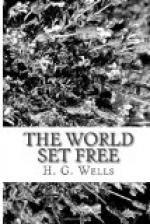‘Never,’ said Edith stoutly....
For a time the talk broke into humorous personalities, and the young people gibed at each other across the smiling old administrator, and then presently one of the young scientific men gave things a new turn. He spoke like one who was full to the brim.
’You know, sir, I’ve a fancy—it is hard to prove such things—that civilisation was very near disaster when the atomic bombs came banging into it, that if there had been no Holsten and no induced radio-activity, the world would have—smashed—much as it did. Only instead of its being a smash that opened a way to better things, it might have been a smash without a recovery. It is part of my business to understand economics, and from that point of view the century before Holsten was just a hundred years’ crescendo of waste. Only the extreme individualism of that period, only its utter want of any collective understanding or purpose can explain that waste. Mankind used up material—insanely. They had got through three-quarters of all the coal in the planet, they had used up most of the oil, they had swept away their forests, and they were running short of tin and copper. Their wheat areas were getting weary and populous, and many of the big towns had so lowered the water level of their available hills that they suffered a drought every summer. The whole system was rushing towards bankruptcy. And they were spending every year vaster and vaster amounts of power and energy upon military preparations, and continually expanding the debt of industry to capital. The system was already staggering when Holsten began his researches. So far as the world in general went there was no sense of danger and no desire for inquiry. They had no belief that science could save them, nor any idea that there was a need to be saved. They could not, they would not, see




